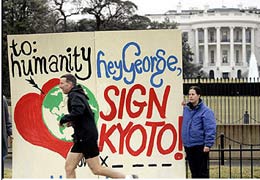
A runner passes an activist holding a huge "Valentine to
humanity" during a protest of US President George W. Bush's withdrawal of
support for the Kyoto Protocol on February 14 in Washington.(Photo:
Xinhua/AFP)
White House spokesman Scott McClellan on Tuesday defended the US
non-participation in the Kyoto Protocol on global warming that is due to take
effect on Wednesday, stressing economic concerns.
Under the Bush administration, "We have made an unprecedented commitment to
reduce the growth of greenhouse gas emissions in a way that continues to grow
our economy," he said.
"We're still learning about the science of climate change," he added.
The Bush administration quit the 141-member Kyoto Protocol in 2001, saying
that complying with the treaty will be too costly for the US economy and that
the global warming theory needs yet scientific proof.
State Department spokesman Richard Boucher said Tuesday the United States is
taking a path different from "countries with binding (greenhouse gas) emissions
restrictions under the Kyoto Protocol, our destination is the same, and
compatible with other efforts."
Boucher said the Bush administration will spend about 5.8 billion US dollars
in 2005 on scientific research, new technologies and programs addressing climate
change.
The State Department said the Bush administration is committed to cutting
greenhouse gas emissions.
In 2002, the White House said it wants to reduce the greenhouse gas
"intensity" of the US economy -- the tonnage of greenhouse gas emissions for
every million dollars of economic output -- by 18 percent by 2012, and called
for voluntary efforts by industry to reach this goal.
The United States is the world's single biggest source of greenhouse gases
and the only industrial nation left out of the Kyoto Protocol which requires the
industrial nations to reduce their gas emissions to below their levels of 1990.
The US absence from the protocol is believed to affect the progress in fighting
global warming.



